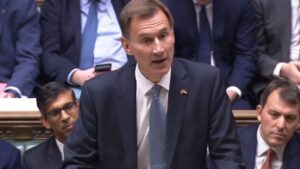The interest the government pays on national debt has reached a 20-year high as the rate on 30-year bonds reaches 5.05%.
A rise in the cost of borrowing comes at a difficult time for the chancellor, Jeremy Hunt, as he prepares for the autumn statement on 22 November.
Mr Hunt has already made clear that tax cuts will not be announced in November.
The higher cost of servicing the country’s debt pile could influence the decisions he makes on spending.
The total amount the UK government owes is called the national debt and it is currently about £2.59 trillion.
The government borrows money by selling financial products called bonds. A bond is a promise to pay money in the future. Most require the borrower to make regular interest payments over the bond’s lifetime.
UK government bonds – known as “gilts” – are normally considered very safe, with little risk the money will not be repaid.
Gilts are mainly bought by financial institutions in the UK and abroad, such as pension funds, investment funds, banks and insurance companies.
The Bank of England has also bought hundreds of billions of pounds’ worth of government bonds in the past to support the economy, through a process called “quantitative easing”
A higher rate of interest on government debt will mean the chancellor will have to set aside more cash, to the tune of £23 billion to meet interest payments to the owners of bonds.
This means the government may choose to spend less money on public services like healthcare and schools at a time when workers in key industries are demanding pay rises to match the cost of living.
The current level of debt is more than double what was seen from the 1980s through to the financial crisis of 2008.
The combination of the financial crash in 2007/8 and the Covid pandemic pushed the UK’s debt up from those historic lows to where it stands now.
But in relation to the size of the economy, today’s debt is still low compared with much of the last century,
The US, German and Italian borrowing costs also hit their highest levels for more than a decade as markets adjusted to the prospect of a long period of high interest rates and the need for governments around the world to borrow.
It follows an indication from global central banks, including the US’s Federal Reserve and the Bank of England, that interest rates will stay “higher for longer” to continue their jobs of bringing down inflation.
During the last financial year, the government spent £111bn on debt interest – more than it spent on education.
Some economists fear the government is borrowing too much, at too great a cost.
Others argue extra borrowing helps the economy grow faster – generating more tax revenue in the long run.
The government’s official economic forecaster, the Office for Budget Responsibility (OBR), has warned that public debt could soar as the population ages and tax income falls.
In an ageing population, the proportion of people of working age drops, meaning the government takes less in tax while paying out more in pensions.
Read more:
Cost of national debt hits 20-year high


























